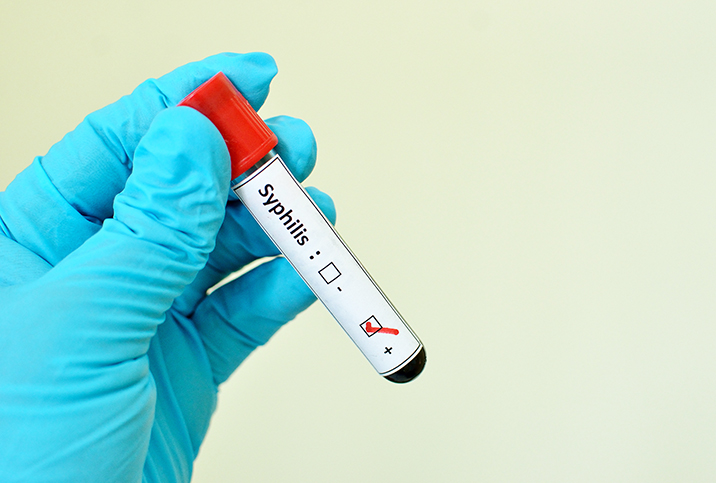A Rare but Dangerous Complication of Syphilis: Meningitis

Syphilis is a complex sexually transmitted disease (STD) that typically presents in four stages. Symptoms in the first and second stages can go unnoticed, ignored and, ultimately, unreported. These first two stages often resolve without the need for medical intervention, after which there is usually a latent phase of five to 20 years with no presenting symptoms.
Though it may seem like everything is fine, this is far from the truth. While syphilis lies dormant in the body, it can still be spread to others, including unborn children. And without medical treatment, people eventually progress to the third stage of syphilis where organs are damaged and death may result.
However, syphilis doesn't always follow this course. Sometimes it takes a different form: neurosyphilis.
Neurosyphilis and syphilitic meningitis
Neurosyphilis occurs when the bacteria responsible for syphilis affect the brain and the nervous system. It can take five different forms, including being asymptomatic.
"Whenever somebody gets infected with syphilis, it goes everywhere, including the brain," said Suman Radhakrishna, M.D., an infectious disease doctor at Hollywood Presbyterian Medical Center in Los Angeles.
Meningeal neurosyphilis occurs when syphilis causes meningitis, an inflammation in the tissues surrounding the brain and spinal cord. This form of neurosyphilis can happen at any point in the infection but is most common in the secondary phase.
Most of the time, the infection in the brain is asymptomatic and clears on its own, but it can persist and cause symptoms lasting anywhere from a few weeks to 50 years after the initial infection if left untreated.
Symptoms of syphilitic meningitis
"Some patients present with a headache, light intolerance, eye pain, maybe bloodshot eyes," Radhakrishna said. "Some also complain of hearing loss…They may see an ophthalmologist for their blurred vision thinking they've been on the computer too much, but they are told their prescription is OK. Then they go to a neurologist for the headache. These patients go through a long route—a CAT scan, an MRI, treatment for migraines—before somebody finally says, 'Nothing is helping. We need to do a spinal tap.'
"Most patients go to a doctor's office with a rash caused by syphilis," she added. "There, they also report having a headache, not seeing properly and high fevers. These people get admitted to the hospital with a diagnosis of meningitis, so they get a spinal tap right away. Treatment is very easy once you know the diagnosis, but arriving at the diagnosis can be hard."
If syphilis reaches the latent phase untreated, it can be years or decades before symptoms become noticeable. Meningeal neurosyphilis is one cause of forgetfulness in older patients.
"Part of the workup for memory loss or any mental issues is checking for syphilis," Radhakrishna explained. "Treatment at that point does not reverse the symptoms, but it may halt the progression."
Who gets it?
Neurosyphilis is quite rare. The reason for this is that most cases of syphilis are detected early due to successful social programs.
"In Los Angeles County, syphilis is endemic," Radhakrishna said. "Because of that, we are required to test all our patients who are at risk for syphilis, [which is] anyone who is sexually active with more than one sexual partner and anyone who shares needles."
The recommended frequency for testing is every three to six months.
Many high-risk patients receive healthcare through social programs and services that allow syphilis to be detected early. Here are some of the communities most likely to become infected:
- People taking PrEP (pre-exposure prophylaxis for HIV). Syphilis is commonly seen among people who have HIV or in people at risk of getting HIV. People who take PrEP are required to be tested for sexually transmitted infections (STIs) several times a year.
- People who use drugs. Syphilis can be spread through shared needles and is more common in people who use hard drugs, intravenously or not. Testing for syphilis occurs at drug rehab clinics and needle exchange programs.
- People experiencing homelessness. Medical services for people who are homeless include testing for syphilis.
- Pregnant people. Testing for syphilis is a routine part of prenatal medical care.
Many people do not fit these categories and, unfortunately, miss out on being tested. Radhakrishna said one of the primary groups is women who are not in their childbearing years.
The COVID-19 pandemic initially decreased the number of people who had STDs in 2020, but the number increased in 2021.
"We saw a lot more syphilis, a lot more ocular disease [from syphilis]," Radhakrishna explained. "The incidence of congenital syphilis is also going up because the moms did not get enough prenatal care. The doctors' offices were not open 100 percent. There were a lot of telehealth visits, and we were scheduling patients so that nobody was in the waiting room. Because of that, though, a lot of these patients fell through the cracks."
Still, syphilitic meningitis is rare.
"Syphilis, a bacteria, is on the list of things that can cause aseptic meningitis, which is usually caused by viruses and, most commonly, herpes, HSV-2," said John Engemann, M.D., an infectious disease specialist with Raleigh Infectious Diseases Associates in North Carolina. "I've seen a lot of syphilis and a lot of meningitis, but I don't recall seeing syphilis causing meningitis, though we always look for it.
"It's much more common to see neurosyphilis, including involvement of the eyes," he added. "There's been a dramatic rise of that in North Carolina these past several years. In those cases, I usually see some meningeal inflammation in the spinal fluid but not frank meningitis."
Protecting yourself
Syphilis rates were at their lowest levels at the turn of the century but have increased annually for the past 20 years.
Syphilis is usually spread during vaginal, anal or oral sexual contact with someone who has early syphilis, meaning during the primary, secondary or early latent period of the infection. The painless sores caused by syphilis are often inside the vagina, mouth or rectum, and neither sexual partner knows they exist.
The best strategy for prevention is to be intimate with your genitalia and take special note of anything unusual. A woman can have a sore near her vagina caused by an infected Bartholin's gland or it may be a syphilitic sore. Either may go away without treatment, so proper diagnosis is important.
Using condoms is the only way to greatly reduce the risk of spreading syphilis, and then only if the sore is in a location where the condom prevents physical contact.
But the bottom line is to get tested.
"Testing for syphilis is easy; it's a blood test. Treatment is easy; it's penicillin," Radhakrishna said. "Anyone who is at risk should get routinely tested for syphilis. For those who are allergic to penicillin, there are other alternatives."
Early treatment not only protects you from sometimes irreversible complications, but it also prevents other people from getting the infection from you.


















